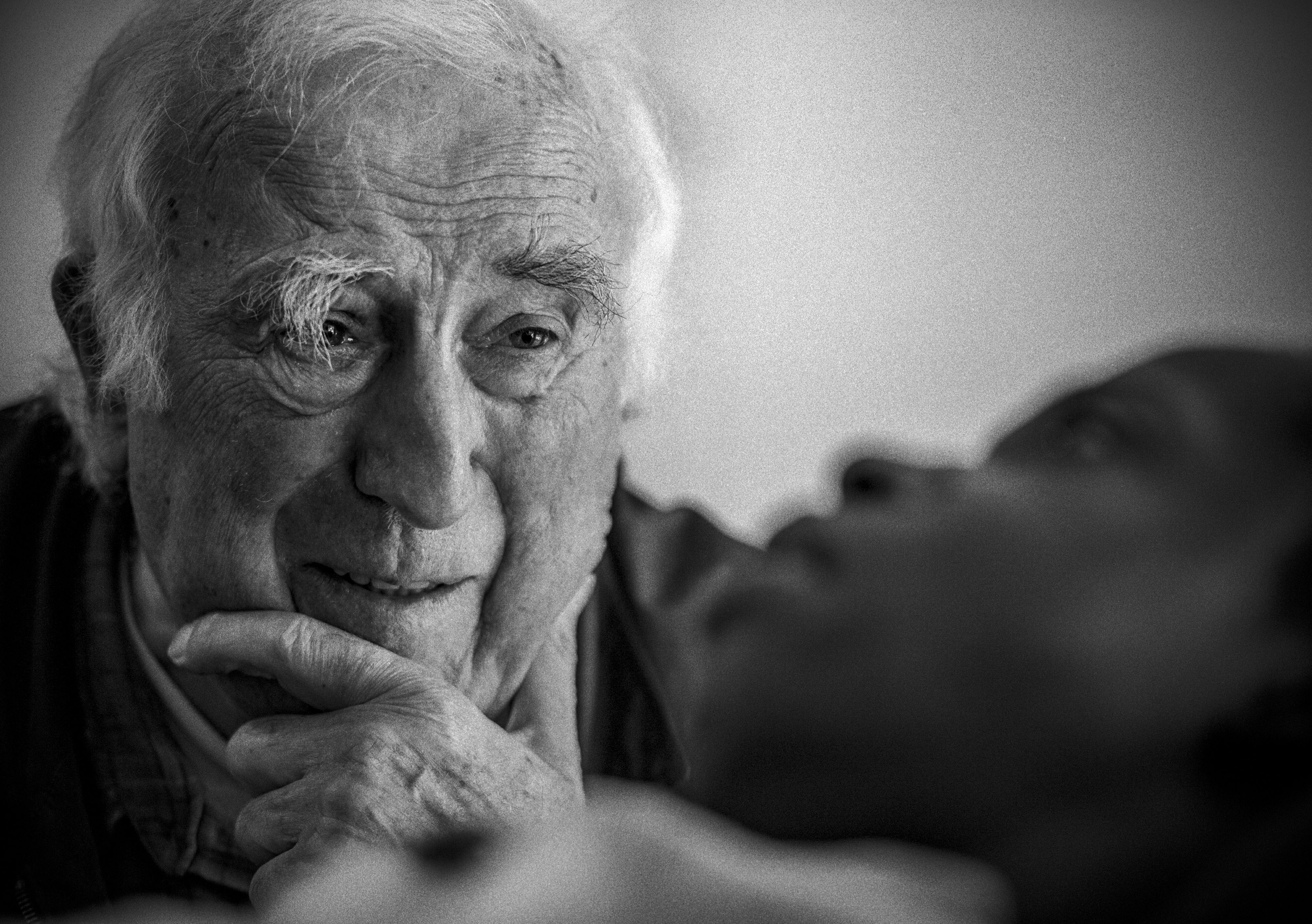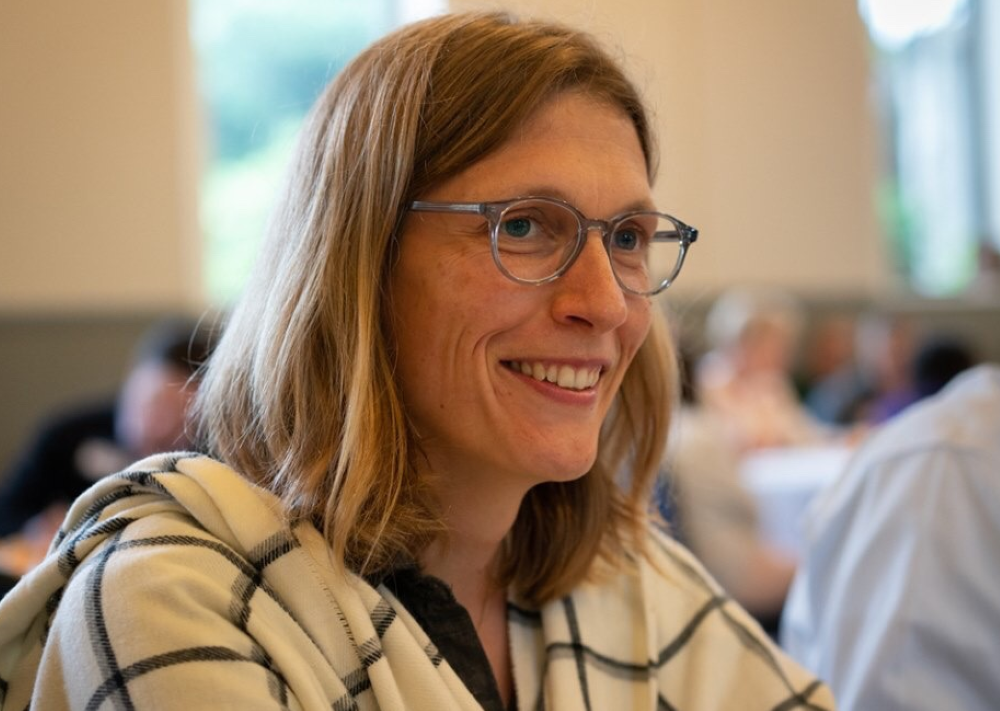
Jean Vanier, founder of the L'Arche communities, appears in the 2018 documentary "Summer in the Forest." Nine months after his 2019 death, an independent study commissioned by the International Federation of L'Arche found that Vanier had engaged in sexually abusive relationships with at least six adult women. (CNS/Abramorama)
When revelations emerged nine months after his 2019 death that Jean Vanier — a philosopher, author and activist once deemed a living saint — had sexually and spiritually abused women, his legacy was upended.
Now a massive report, released Jan. 30, seeks to untangle and analyze many pieces of the dark and complex story of Vanier's decadeslong hidden life, highlighting both the extent of abuse and the "incredible persistence of a perverse nucleus" of abusers.
Produced by an independent, interdisciplinary commission of French academics, the nearly 900-page report validates the claims of 25 non-disabled women against Vanier, who founded a worldwide organization supporting adults with intellectual disabilities. As part of a sectarian group led by Vanier's spiritual mentor, Dominican Fr. Thomas Philippe, the charismatic Vanier identified people seeking spiritual guidance and exploited them for sexual purposes.
The new report builds upon an investigation launched by Paris-based L'Arche International that in 2020 revealed Vanier had participated in a secret group and engaged in coercive sexual relationships with six non-disabled women.
'Why the collective blindness? Why wasn't he stopped?'
—Claire Vincent-Morey
"New pieces of information are numerous and enable us to see, in a sense, from within the sectarian group," Florian Michel, a professor at Panthéon-Sorbonne University in Paris and one of two historians on the commission, told NCR.
Among threads explored in the report: The group evaded detection for decades and was bound by a feeling of persecution and a conviction of a divine election; the church's practice of secrecy around matters of morals and the inefficacy of church sanctions allowed Philippe to maintain his abusive activities; the charismatic authority of Vanier, who was intellectually and sexually formed by Philippe, essentially sealed him off from accountability.
"On each occasion, Vanier's reputation for holiness, his prophetic charisma acknowledged by many, and the collective belief in his legitimate authority on all matters — spiritual, human, professional — helped to create an atmosphere in which it was almost impossible for these women to question Vanier's attitudes, words and actions with them," commission member Claire Vincent-Mory, a sociologist and postdoctoral researcher at the Centre for European Studies and Comparative Politics in Paris, said in an interview with NCR. "The environment in L'Arche and the social acclaim for Vanier contributed to the silence of these women and to the persistence of confusion, control and abuse."
Jean Vanier, founder of the L'Arche communities, is pictured in a March 3, 2011, photo. A new 900-page report validates the claims of 25 non-disabled women that Vanier for decades had identified people seeking spiritual guidance and exploited them for sexual purposes. (CNS/Courtesy of Jean Vanier Association)
The six researchers, following a two-year inquiry, concluded that L'Arche as an organization "has nothing to do with a sect." However, the concept of living in community with people who have intellectual disabilities "was originally only necessary to create an official support, a 'screen,'" for a reunion of men committed to the "mystical-sexual" beliefs they received from Philippe, says the report.
NCR was given a copy of the translated report conclusion before release of the full document.
At the same time, researchers found the origins of L'Arche were not merely a screen. "We find that it coexists from the start with a sincere intention to devote oneself to people with disabilities," reads the report. "The two intentions, without contradicting each other, are, for the group, in coherence. The opportunity offered to them may even seem 'providential' to them."
Vanier had at one point visited mental institutions and had said he was horrified by the conditions for patients. His vision was that people with intellectual disabilities could live in homes with non-disabled adults.
L'Arche operates 154 communities in 38 countries, including houses in Washington, D.C., and Portland, Oregon.
There was no evidence that the beliefs and practices of the group spread beyond a limited circle of a few people, nor was there evidence the abuse proliferated within L'Arche, according to the report. Vanier's abusive behaviors, though, occurred beyond the sect's nucleus in France, in other countries and communities. The researchers note other victims may come forward.
The report did not clearly state how many people were in the group of abusers.
Any victims of Philippe and of Vanier, whether they live in France or abroad, have the opportunity, if they wish, to engage in a process of restorative justice, said Tina Bovermann, national leader for L'Arche USA.
The report "has given me a deepening awareness of what occurred, and I'm very mindful of the experiences of these women and the insidiousness of the spiritual, psychological and sexual abuse they experienced," Bovermann told NCR. "The mix of that is heavy."
The women told mediators and interviewers they felt grateful for how L'Arche has handled the investigations and that they hope the process brings them closure, according to Bovermann. "Our hope is that we do right by these women," she said.

Tina Bovermann is national leader for L’Arche USA. A 900-page report detailing the sexual and spiritual abuse and secret sect of L’Arche founder Jean Vanier and his "spiritual father," Dominican Fr. Thomas Philippe, was released Jan. 30. "Our hope is that we do right by these women," Bovermann said. (Courtesy of Tina Bovermann)
The 25 victims include married and single women and vowed religious; at least one woman is from the United States, though all the abuse accusations studied by the commission occurred in France. Vanier's known abuse spanned from 1952 until just before his 2019 death.
Members of the commission — one sociologist, a theologian, a psychiatrist and a psychoanalyst, and two historians — studied thousands of letters, including those Philippe and Vanier exchanged and nearly 100 Vanier sent to nuns. They also conducted more than 100 interviews.
Documents were obtained from the Dicastery for the Doctrine of the Faith and the Dominican archives in Rome as well as from the French Dominicans, an Ottawa library and the Vanier family in Canada. Vanier was born in Geneva, Switzerland, but was a Canadian citizen.
Due to Philippe's and Vanier's correspondence, access to archives and the "precise and courageous testimonies of the victims," the investigators in the report write, "we were able to analyze the mechanisms deployed by the two men from the inside: influence, sexual abuse, collective delirium, theological corruption of notions at the heart of Christianity, spiritual deviation, manipulation, incestuous representations of relationships between Jesus and Mary."
Researchers followed the lives of Philippe and Vanier from 1950 to 2019, examining the developments of the sectarian nucleus that was able to grow and persist for more than 50 years.
In 1946 Philippe, who became a spiritual father to Vanier, founded L'Eau Vive as an international formation center in France. The location linked the sect. After departing from the Royal Navy, Vanier, then in his 20s, joined Philippe there.
'What is it about the power that these perceived spiritual, saintly men hold and are given that allows for hidden, manipulative and distasteful behavior?'
—Tina Bovermann
This period "serves as a moment of initiation, of discovery, in a great confusion of the sexual, the emotional and the spiritual," according to the report. "T. Philippe's beliefs and influence suddenly give him access to the world. The experience lived during this period comes to constitute in his eyes, the intimate base, the guiding axis of his life."
In 1952, after several women accused Philippe of sexual and emotional abuse, the Dominicans removed the priest from L'Eau Vive, and the Holy Office (now Dicastery for the Doctrine of the Faith) investigated. Philippe was forbidden to teach, to exercise his ministry and to administer sacraments. The Holy Office also decided to close L'Eau Vive and to disperse its members, who were permanently forbidden to regroup.
(Leaders of L'Arche learned in 2014 about allegations concerning Philippe, who died in 1993, although Vanier said publicly in 2015 and 2016 that he had not known of any abuse. "We now know that Jean Vanier lied," read the 2020 report.)
With lies, disguises, letters, secret code and tree holes used for their messages, "the sect rebuilt the network," said Michel, noting it sounds like a fantastical novel.
In 1963, during the Second Vatican Council, "without being forgiven or allowed to do it, Thomas Philippe goes back to France and escapes the radar of the Holy Office," Michel said. The French Dominicans, "not knowing the full story, wanted to turn the page in the name of 'mercy' " and the local bishop, also unaware of the full story, tried to defend Philippe and Vanier, partially in the name of the "episcopal rights" Vatican II had reinforced.
"Rome in the 1950s seriously underestimated the determination of the sectarian group to stick together and not to obey," Michel said. "For instance, Rome had absolutely no clue that in spite of the judgment given in 1956, the members were still in contact and that in 1964 they were once again together."
The report also calls attention to a "structural limit" of the church: "the secrecy which legally surrounds the matters of morals dealt with by the Holy Office."
If in certain cases it can be justified, "we must emphasize that the nondisclosure of the exact causes of T. Philippe's conviction is precisely what helped maintain his reputation for holiness and rewrite history as he saw fit."
Following the initial report in 2020, many admirers of Vanier and L'Arche members grappled with the seeming contradictions within a man whose behaviors violated the values he had long proclaimed and appeared to live.
Pope Francis visits with the "Chicco" community, part of the L'Arche movement, in Ciampino, Italy, May 13, 2016. L'Arche operates 154 communities in 38 countries, including houses in Washington, D.C., and Portland, Oregon. (CNS/L'Osservatore Romano)
Yet what appears a contradiction "might be in fact the difficulty that comes with changing our view of the man whose sanctity has been so celebrated," Vincent-Mory said.
Vanier held erroneous beliefs he inherited from Philippe that led him to develop reprehensible relationships with women, "marked by confusion, control and abuse," she said.
"But how could this have prevented him from also wanting, at the same time, to invest himself in an experimental initiative, which then became a major international organization in the field of disability, a source of good for many? One dimension is hidden, the other is public."
Vincent-Mory said the real question in her view is why the hidden part of his beliefs and actions was not spotted earlier. "Why the collective blindness? Why wasn't he stopped? These questions bring us back, in my opinion, to the problem of idealization and early sanctification of Jean Vanier."
Vanier received abundant honors and awards during his lifetime, including the Templeton Prize and the Legion of Honor, France's highest award. Many schools were named after him, and Pope Francis called Vanier a week before his death to thank him for his ministry and witness.
Bovermann said the new report has led her to reflect upon the interplay of gender, power and charismatic leadership.
"In the wake of the Me-Too movement, I would be hard-pressed to find a charismatic woman" who inflicted abuse in the manner of Vanier, she said. There are many such men, she said.
"What is it about the power that these perceived spiritual, saintly men hold and are given that allows for hidden, manipulative and distasteful behavior?"
Advertisement
L'Arche is developing tools to help community members process the contents of the report. "Anybody could find a trigger point in this — there are so many painful elements," Bovermann said. She noted the rates of abuse are higher among those with intellectual disabilities nationwide, and L'Arche is providing trauma-informed tools for them.
Since 2017, L'Arche has invested in safeguarding people with and without disabilities within L'Arche, according to a press release from the national organization. The commission report "gives valuable insights into the dynamics of authority and power, spiritual expression and methods of accompaniment in L'Arche's history."
"The new report will be used to renew L'Arche's leadership model and curriculum, and to fuel momentum to make L'Arche as inclusive and diverse as its mission promises, particularly here in the U.S."
In a letter to supporters, Bovermann writes that L'Arche "painfully accepts the truth that was revealed."
"Truth is always powerful. Truth is always right. We believe in its justice and are grateful for the opportunities that it invites."








